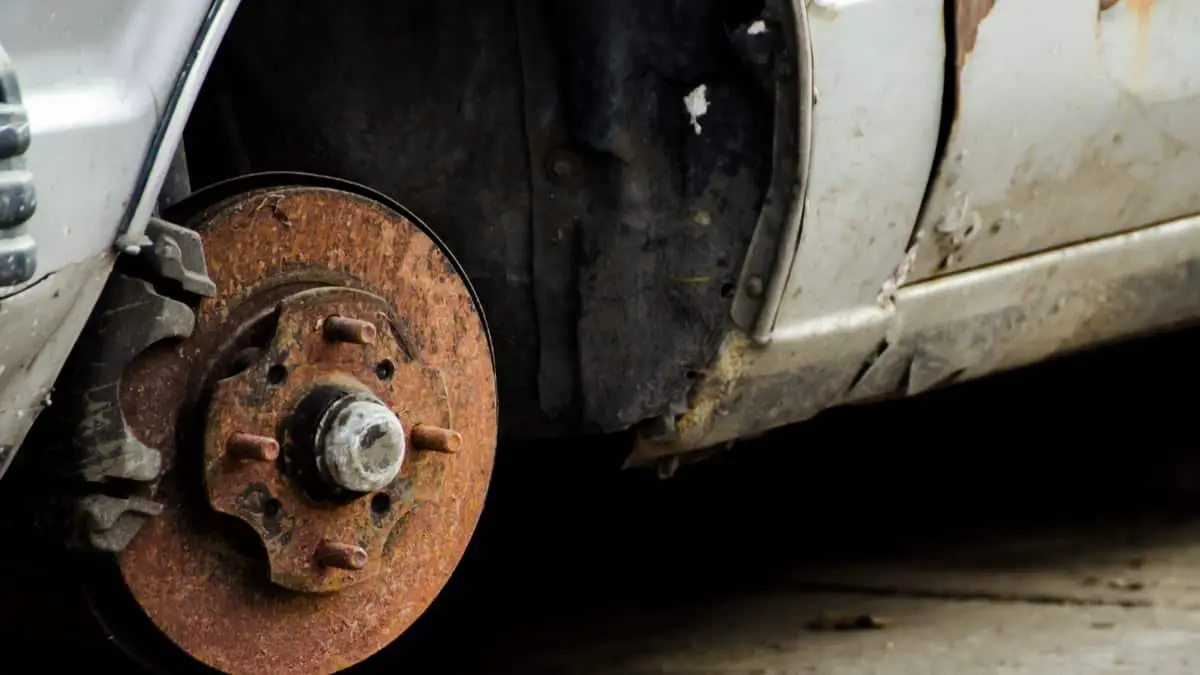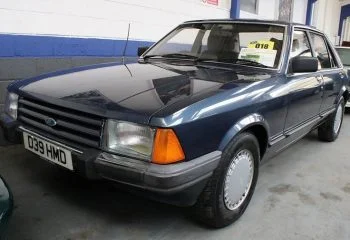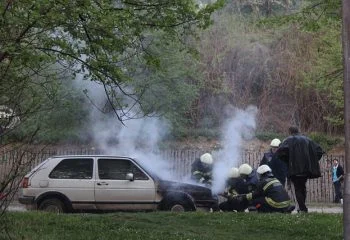Have you ever found a squeaking noise while driving but not brakes applied? Has the sound come on without warning while you are behind the wheel and not when brakes are applied? If so, this could be due to several reasons, some of which may be more severe than others.
In this blog post, we’ll discuss what could be causing that unanticipated squeaking or squealing noise when driving your vehicle but no brakes have been applied.
We will provide tips on how to troubleshoot further in an effort to determine the issue at hand as well as steps for repair depending upon diagnosis results. Read on for more information about why your car is making a pesky squeaky noise but no brakes have been applied.
What's in this post?
What Make The Squeaking Noise While Driving But Not Brakes Applied? How Can We Deal With It?
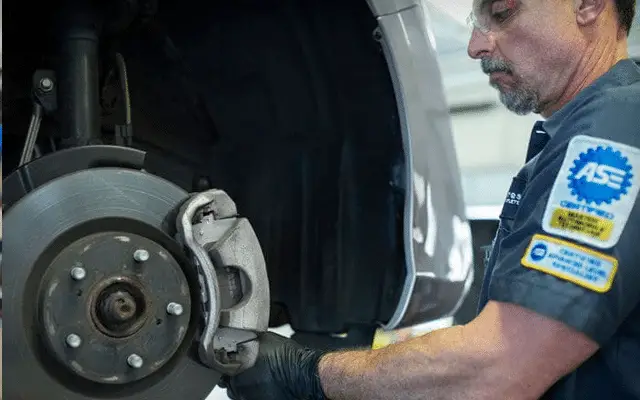
Foreign Object
The first thing you need to understand is that your car’s brakes are designed to grip the rotor (the disk that your brake pads grip onto) in order to slow down or stop your car. When you hit the brakes, the brake pads clamp down onto the rotor and create friction. It’s this friction that slows down or stops your car.
Now, imagine what would happen if there was something between the brake pad and the rotor. That’s right, the brakes wouldn’t be able to grip the rotor as effectively, and it would take longer to stop your car. In some cases, it could even cause your car to swerve. So, if you’re hearing a squeaking noise while driving but not brakes applied, it’s likely because there’s something between your brake pad and rotor.
How to Fix It
The most common culprits are pebbles and pieces of rocks. These can get wedged between the brake pad and rotor, causing all sorts of problems. Fortunately, there is an easy fix. All you need to do is remove the foreign object from between the brake pad and rotor. You can do this by opening up the brake caliper (the housing that holds the brake pads) and removing the object manually.
If you’re not comfortable doing this yourself, you can always take it to a mechanic or a dealership. They’ll be able to quickly remove the foreign object and have you back on the road in no time.
Old Brake Pads
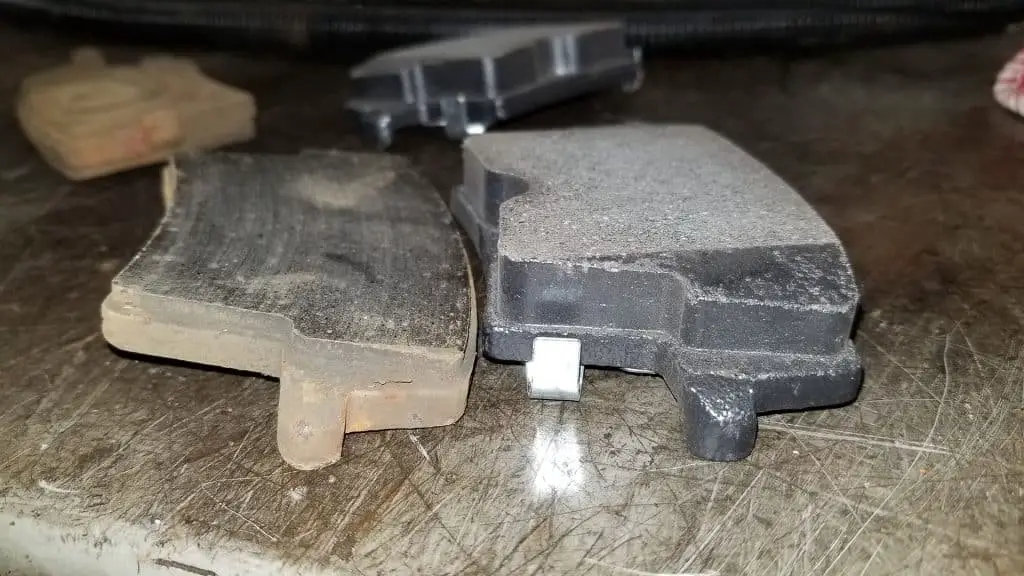
The most common cause of squeaky brakes is simply old brake pads that need to be replaced. As brake pads age, they begin to lose their effectiveness as the material wears away. This can lead to decreased performance over time, which could eventually affect your safety on the road. Plus, there is the added annoyance of having to listen to that annoying squeak every time you press on the brakes!
In some cases, the source of the squeaking may not actually be the brake pads themselves but rather other components such as faulty calipers or rotors. In these cases, replacing just your brake pads may not solve the problem entirely. It is important to have an experienced mechanic inspect your vehicle for any other potential issues with these components before attempting any repairs.
How to Fix It
Fortunately, this issue can usually be resolved quite easily by replacing your worn-out brake pads with new ones. Just make sure that you buy quality replacement parts from a reputable seller—cheap parts may save you money in the short term but they will likely require more frequent replacements down the line.
Mechanic’s Fault
Mechanical errors in cars can occur due to incorrect auto repair procedures such as failing to lubricate the brake pins or spraying anti-seize on the brake pads after changing your rotors. Additionally, if there is an issue with the suspension system or other components of the car, this could lead to a loud grinding sound that’s indicative of a serious mechanical issue.
How to Fix It
If the problem happened right after your car was repaired, the mechanic may have been careless, go back and ask them to check it more closely before it becomes worse. In order for them to properly diagnose any potential issues with your car, they will need to inspect it closely and do some tests such as checking its brakes and suspension system.
They may also need access to diagnostic tools such as computer scanners in order to determine what exactly is causing the problem. After they have identified what’s causing the mechanical error, they will then be able to recommend repairs or replacements necessary in order for your vehicle to operate safely and without further issues.
Glazed Rotors
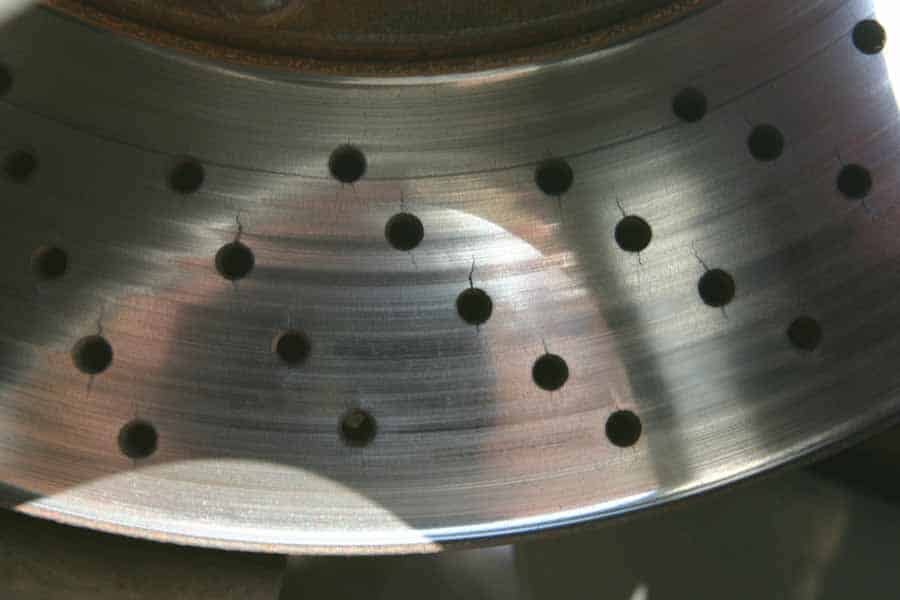
The first possibility is that your rotors are glazed. This happens when the brake pads wear down too much and start to grind against the rotors. The result is a thin layer of brake pad material that gets fused to the rotor surface. This can cause a squeaking noise, but it will usually go away when you apply the brakes since the pressure from the pads will smooth out the glaze.
How to Fix It
To fix this problem, you’ll need to have the rotors sanded down so that they’re smooth again. You can do this yourself with some sandpaper and elbow grease, but it’s probably best to leave it to a professional if you don’t have much experience working on cars. Once the rotors are sanded, the squeaking should go away.
Grooved Rotors
The other possibility is that your rotors are grooved. This happens when bits of metal from the brake pads get embedded in the rotor surface. Over time, these bits of metal will work their way down into the grooves and cause a squeaking noise. The good news is that this problem is usually easy to fix.
How to Fix It
All you need to do is remove the brake pads and use a wire brush or similar tool to clean out the grooves in the rotor surface. Once they’re clean, just put the pads back on and you should be good to go. No more squeaking.
Uneven Tire Tread Wear
Uneven tire tread wear is an issue that affects many vehicles on the road today. It occurs when one or more tires wears down faster than the others, resulting in an uneven surface across all four tires. This type of wear is caused by a variety of factors, including improper inflation, misaligned wheels, or excessive weight on one side of the car.
In some cases, it may also be caused by driving habits such as accelerating too quickly or taking corners too fast; these types of maneuvers put additional strain on your tires and can lead to uneven tread wear over time.
When your tires are properly aligned and inflated, they move smoothly along the road without making any sounds. However, when they become worn down unevenly, they begin to vibrate against the ground as you drive—which eventually leads to a loud squeaking noise. This noise might also get worse when turning or braking because these maneuvers cause even more strain on your already worn-down tires.
How to Fix It
If your vehicle is suffering from uneven tire tread wear and making squeaking noises while driving, then it’s time for some repairs! The first step is to have your wheels professionally aligned; this will help ensure that all four tires are wearing evenly and reduce stress on each tire individually.
You should also check the air pressure in each tire and make sure that they are all inflated to their recommended levels; this will help reduce any unnecessary strain on your tires as well as improve fuel efficiency. Lastly, if necessary, replace any damaged or worn-out tires with new ones so that you can safely drive without worrying about hearing any more squeaking noises.
Brake Pad Materials Can Be A Problem
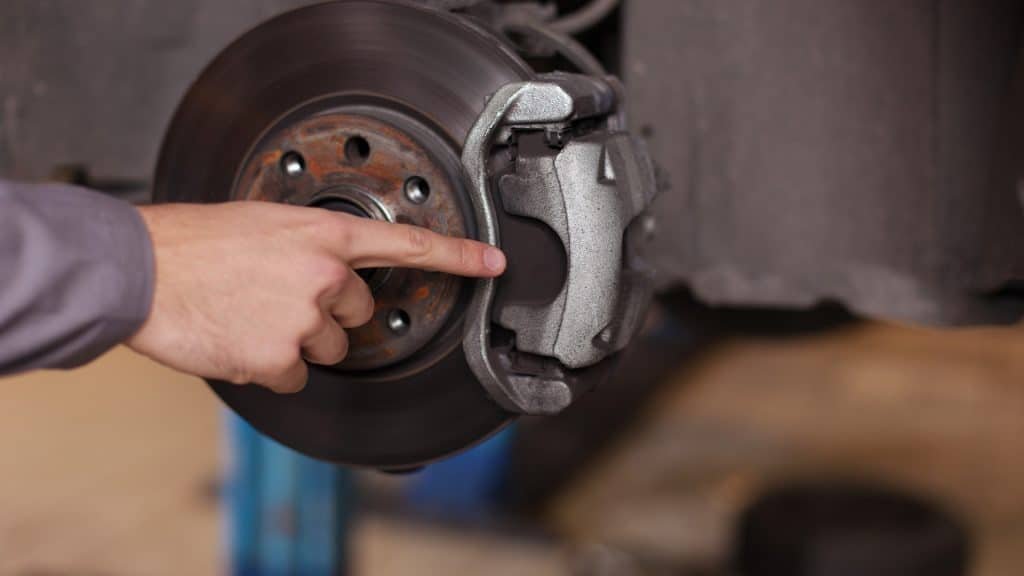
Brake pads are made of two types of materials: semi-metallic and ceramic. Semi-metallic brake pads are made of steel fibers embedded in a metal backing plate. Ceramic brake pads are made of ceramic fibers with a metal backing plate.
The steel fibers in semi-metallic brake pads are prone to rusting. When they rust, they can cause the brake pad to squeak. The ceramic fibers in ceramic brake pads don’t rust, so they don’t typically cause this problem.
How to Fix It
If your brakes are squeaking because of the brake pad material, there are a few things you can do about it. The first is to switch to ceramic brake pads. The second is to apply a thin layer of high-temperature grease to the back of the brake pad where it contacts the caliper piston. This will help minimize friction and noise.
Moisture Causes Rust Formation
The most common cause of squeaking noises coming from your car while in motion is rust build-up on your vehicle’s suspension components or brake rotors. This usually occurs due to exposure to water, which can cause metal parts to corrode over time.
When this corrosion builds up enough, it can create a grinding noise as the metal scrapes against one another. This type of noise is most likely to occur after a long drive in wet weather conditions or after washing your car with a hose.
If your car is making this type of noise due to rust and corrosion caused by moisture, there are some steps you can take to reduce the sound. One option is to spray an antirust agent directly onto the affected area.
This will help reduce friction between metal parts and should stop the squeaking noise immediately. You may also want to consider replacing any rusted components with new ones if necessary. Lastly, make sure that you keep all areas of your vehicle dry and clean as much as possible in order to prevent further corrosion from occurring.
Your Caliper is Stuck
Caliper pistons help apply force to the brake pads when you press the brake pedal. They also help keep the pads in place while they’re engaged with the rotors. If a caliper becomes stuck, it can cause friction between the pads and rotor, leading to an irritating squeaky noise when driving.
The best way to know if your caliper is stuck is by inspecting it visually. First, jack up your car so that all four wheels are off the ground, and remove each wheel one by one until you find the source of the noise.
Once you locate it, look for any signs of rust or corrosion around the caliper and check for any visible deformation or damage. If everything looks normal but you still hear a squeak when driving, then chances are, your caliper has become stuck due to debris getting trapped in its cylinder or piston seals.
How to Fix It
If you suspect that your caliper is stuck due to dirt or debris trapped inside of it, then all you need to do is clean out its seals and re-lubricate them with brake fluid or grease before re-installing it onto your vehicle.
You can also try loosening up any rusted bolts holding it in place as well as cleaning off any dirt buildup on its surface with a wire brush before attempting to move it again. If all else fails, then replacing the entire unit may be necessary in order for it works correctly again without making any unwanted noises while driving.
Lack of Lubrication in Steering System
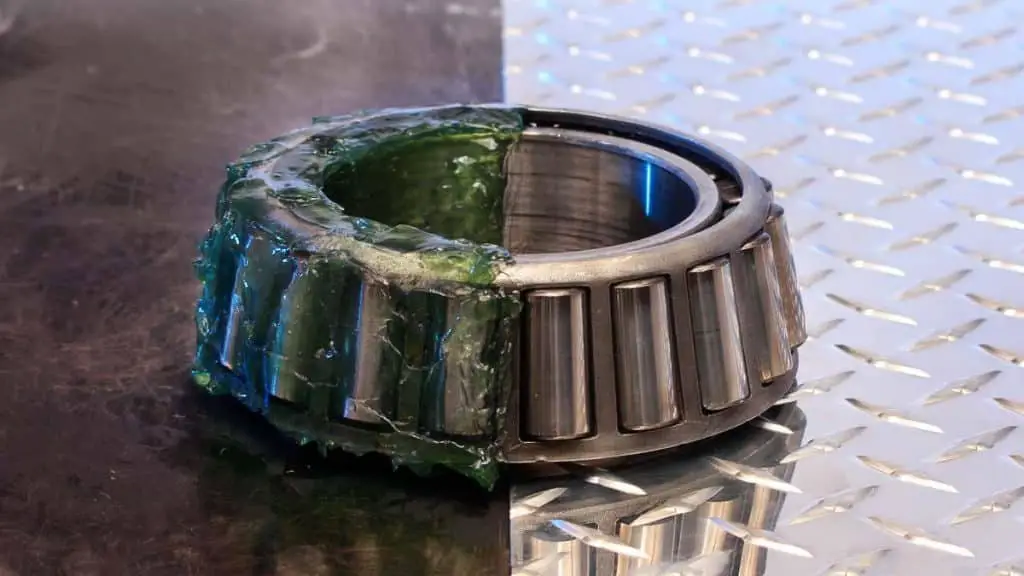
The most common cause of a squeaking noise in your steering system is lack of lubrication. This happens when the grease or oil that lubricates the moving parts becomes dry or runs out over time due to wear and tear. Without proper lubrication, the metal components of your steering system will rub together and create friction, which can lead to a squeaking noise when you turn the wheel.
How to Fix It
Fortunately, there’s an easy fix for this issue—simply add more grease or oil to the affected area. You should also check for any other signs of wear and tear such as cracks or broken parts that could be causing the issue. Once you’ve identified any potential problems, make sure to replace or repair them before adding more lubricant. This will ensure that your steering system stays well-lubricated for longer periods of time.
Why Only When Driving?
It’s important to note that if your car only squeaks when driving but not when brakes are applied, then it could be because of an uneven surface on the road or worn-out shock absorbers. Uneven surfaces can cause vibrations in your car’s suspension which can make it sound like something is rubbing against each other even when there isn’t anything wrong with the actual parts themselves.
Worn-out shock absorbers can also cause similar noises when driving over rough terrain as they don’t dampen vibrations as effectively as new ones would. Replacing these components should help reduce any noises caused by these issues.
Conclusion
To recap, squeaking noise while driving but not brakes applied should never be ignored. They might just be harmless but they can also reveal a lot about the overall health of your car.
Periodic maintenance checkups are an excellent way to detect any underlying issues and have them looked at by an experienced technician before they worsen. Making sure that all necessary parts are in top condition is crucial in preserving the performance of your vehicle and keeping it running safely and smoothly on the roads.
While sometimes a costly affair, preventive care is still better than dealing with expensive repair bills down the line! We hope this blog post has helped provide some helpful insights for those who find themselves trying to figure out why their vehicles are making strange sounds.

